132 Search Results for isaac
December 11, 2012
by Carole Zangari -
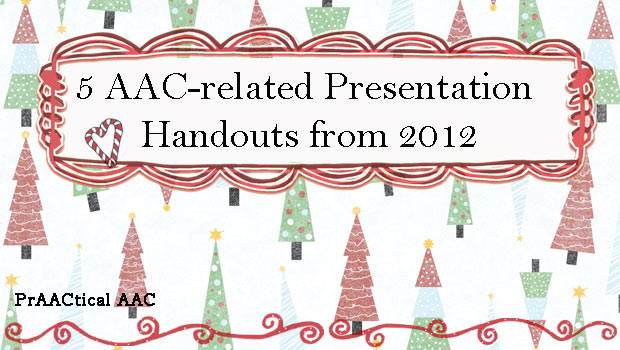
One of our deepest holiday wishes is that every AAC-loving clinician could have an increased travel budget for professional development. Until then, here are some handouts from AAC presentations at conferences around the US. From the ISAAC Biennial Conference in Pittsburgh: Effects of Early AAC Intervention for Children with Down Syndrome by Janice Light and Kathryn Drager This was a well-attended session by Jane Korsten & Terry Foss at ISAAC 2012: Assessment Strategies for Individuals with Sensorimotor Differences Wish I could have been at Deanna Wagner’s session at ARSHA on AAC for Students with Visual and Multiple Disabilities: How to Plan and Implement a Successful AAC Treatment of Childhood Apraxia of Speech: A Checklist for Evidence-based Practice by Sue Caspari at the 2012 ASHA Schools Conference Theresa Bartolotta & Patricia Remshifski’s ASHA session on Communication & Swallowing in Rett Syndrome: An Update for Clinicians
October 4, 2012
by Carole Zangari -
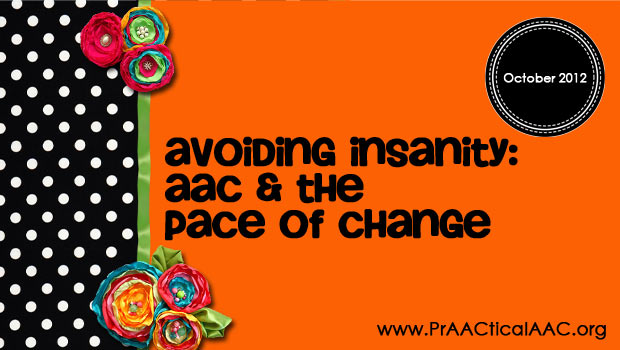
Although the field of AAC emerged only in the last few decades, the notion of communicating in alternative ways is centuries old. In classical times, the use of manual communication by deaf individuals was referred to by Plato and documented in Europe during the Middle Ages. In North America, American Indian Hand Talk evolved over generations to allow cross-cultural communication between speakers of diverse languages. As a clinical/educational field, AAC has been described as evolving through a “bottom-up” mechanism. Individuals with congenital conditions that prevented the development of intelligible speech invented their own communication systems long before teachers, therapists, and clinicians formalized instruction in alternative modes of expression. AAC users growing up in the forties and fifties tell of communicating through grunts, vocalizations, “air writing,” and eye movements, which, though effective in some contexts, were maddening in their limitations. Individuals who were fortunate enough to have access to habilitative and... [Read More...]
August 25, 2012
by Robin Parker -

We live in Florida and there are lots of general summer storms. They can be very loud and dark. There are also many hurricane warnings (like now for Hurricane Isaac). Many children and adults with communication challenges can become upset or anxious because of the loud noises, the change in routines, and/or the heightened state of anxiety that is usually around the house or community. Because of this we are often asked to help find visual support resources. Here are some great prepared visual support stories and resources that we use: Bad Weather Tips and Story by Hands in Autism Hurricane Preparedness More Hurricane Preparedness Thunder/Lightning Storms Thunder Box Sometimes though the prepared supports do not meet the needs for specific learners. Here are our tips for developing your own storm visual supports and resources Creating Personal Participation Stories Use language of the story that is at the... [Read More...]
August 1, 2012
by Carole Zangari -
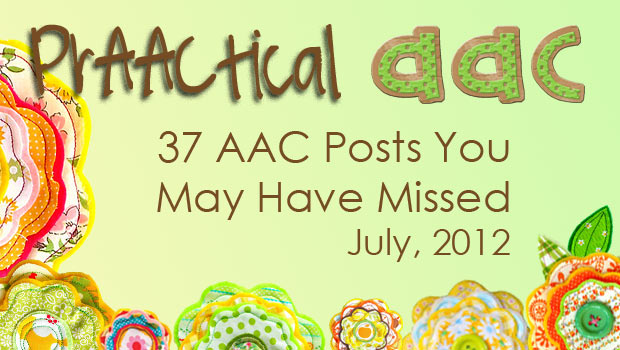
Biennial Conference: ISAAC 2012 PrAACtically There: ISAAC 2012 Day 1 at ISAAC 2012: What You Should Know About AAC’s Expanding Role in Health Care ISAAC 2012, Day 2: AAC Goes to Preschool ISAAC 2012, Day 3: Let the Games Begin ISAAC 2012, Day 4 – The Fives 5+5 Commandments for Speech Output Communication 5 Under-Used Strategies in AAC 5 Online Notebooks Full of AAC 5 Adapted Play Resources for Children with Motor Impairment – PrAACtical Thinking 92 Free or Lite Versions of AAC Apps PrAACtical Alert: Free AAC Evaluation App This Week Visualize 9 Nice Things to Say to Students who AAC PrAACtical Thoughts About Challenging Behavior PrAACtical Resource: Searching for AAC Devices with SpeechBubble AAC Assessment Round-Up 5 Ways to Use Rating Scales to Enhance Communication with AAC PrAACtical Alert: The World’s AAC Conference Comes to You (Well, a little bit of it) Power of the Visual Planner: 20... [Read More...]
July 25, 2012
by Carole Zangari -
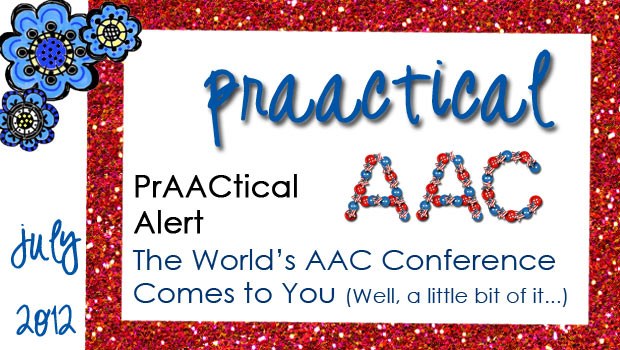
I am so very lucky to be able to go to Pittsburgh this weekend for the biennial conference of the International Society for Augmentative and Alternative Communication (ISAAC). You can check back here for some comments and highlights on the conference. Also, for those of you who use Twitter (or were looking for an excuse to dive in), you can get updates from a group of ISAAC Twitter Delegates and others throughout the entire conference. Follow #ISAAC2012, if you want a peek into what is going on. –
March 31, 2012
by Carole Zangari -
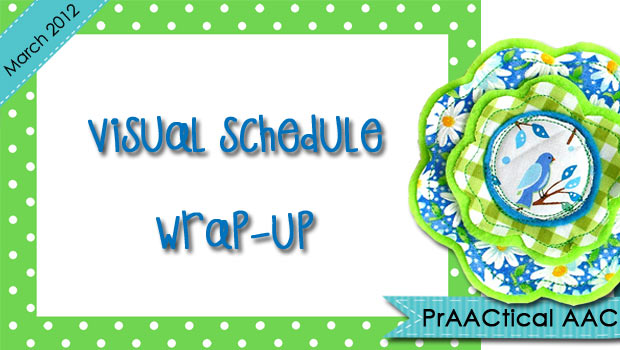
In this last post on our March Strategy of the Month, visual schedules, we address a couple of questions about using schedules and end with a list of helpful resources. Lots to click on and explore! – What about activities that don’t happen very often? How do we incorporate those into the schedule? Many of the learners with whom we work get quite stressed when the typical routine is violated. It could be an undesired change, like a fire drill or a dentist appointment. Or it could be that a regular event gets cancelled, such as when our music therapist is out sick or when outdoor recess is cancelled due to bad weather. Even changes that involve the addition of a positive event, such as a birthday party or a special classroom guest, could lead to stress and meltdown. If we have advance notice of the change, we can use... [Read More...]
March 24, 2012
by Carole Zangari -
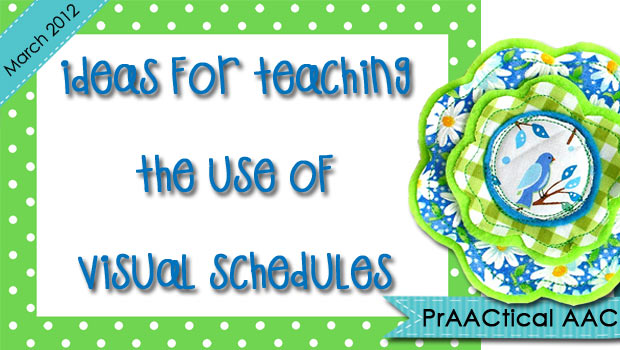
There’s nothing more depressing to us than walking into a classroom in the spring and seeing pristine visual schedules. Why? Because it probably means that the students aren’t really using them. We cheer when we see schedules that are rumpled and dog-eared, not shiny. Show me a battered and tattered visual schedule, and I’ll show you one that gets used every day. Sadly, that’s not always the case. – The bridge between having a visual schedule and consistently using it is one that many learners don’t seem to cross. Here are some of our ideas for helping your AAC learners to the other side. – 1. Have a plan to teach the schedule. If you are working one-on-one with a learner, you can easily implement the schedule and get them using it with most-to-least prompting. If you’re working with a group or a classroom, consider staggered implementation. Teaching 12 beginners... [Read More...]
February 15, 2012
by Carole Zangari -
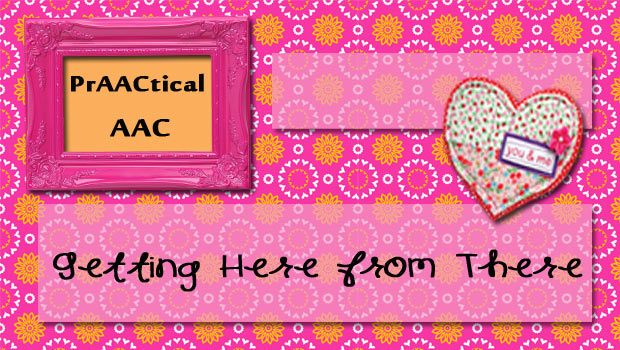
We wanted to take a breather from all the busyness to reflect on the year and to offer up some words of appreciation. For us, 2011 started with our version of a retreat: a long walk in the sun, a half day of venting our frustrations and a half day of planning new projects interspersed with lunch at the beach. (There might have been a bottle of wine in there somewhere, too.) We’d both been feeling more than a bit discouraged that the quality of AAC services is still so spotty. There are some fantastic SLPs and teachers, of course, but not enough to go around. The ‘good ones’ are too busy. And the not-so-good ones were doing too much damage. It seemed to us that too many folks with significant communication challenges weren’t getting what they needed and that stressed us out to no end. Just when we had calmed down, we... [Read More...]
February 3, 2012
by Robin Parker -
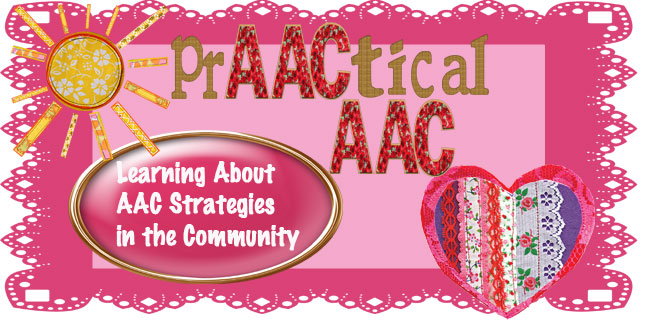
How we integrated AAC strategies into a community event… The name of our website is PrAACtical AAC. We continue to look for ways to make AAC strategies fit praAACtically into ALL activities. We are extremely proud to be part of the Dan Marino Foundation WalkAbout Autism, which is a large South Florida Community Event. The Walkabout helps raise money services for individuals with autism and other developmental disabilities and their families. It also promotes a sense of community collaboration and awareness about autism spectrum disorder and developmental disabilities. We are including this information about the WalkAbout not as a plea for money (although read about the WalkAbout and donate if you are so inclined), but instead to tell you how we are incorporating AAC into community events. This past weekend was the 2nd WalkAbout Autism. It was a truly amazing event and day! There was great music and bounce houses,... [Read More...]
January 18, 2012
by Carole Zangari -
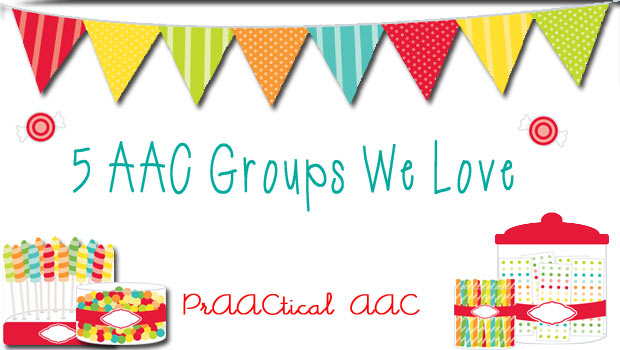
It’s great to have some places to turn to when we need answers to AAC questions, resources to share, and the like. Here are some of the AAC groups that we’ve been able to count on for support. 1. ACOLUG: An oldie but a goodie. Run by Diane Bryen and Tracy Rackenberger, this email list is primarily a venue for people who use AAC to connect with one another but, in the spirit of inclusion, keeps the list open to professionals and students as well. 2. ASHA SIG 12: We can always count on their quarterly publication, Perspectives on AAC, and the online AAC community for support and pertinent information. We miss their annual conference, though! 3. Communication Matters AAC Forum : The ISAAC UK Chapter runs this and it is chock full of helpful information. We love the search feature and the digest options. 4. PACT: Promoting Augmentative Communication... [Read More...]









